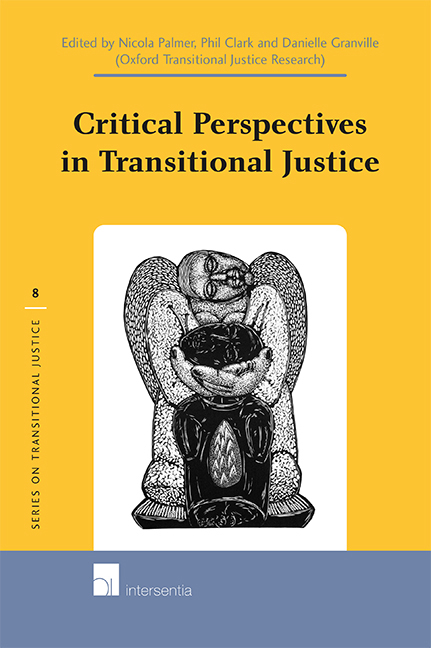Book contents
- Frontmatter
- Note
- Acknowledgements
- Contents
- Abbreviations
- Introduction
- Section 1 Critiquing Core Concepts in Transitional Justice
- Section 2 Accountability, Human Rights and the Rule of Law
- Section 3 Locality and Legitimacy
- Section 4 Memory, Ritual and Apology
- Section 5 Transitional Justice After Transition
- Contributors’ Biographies
- Series on Transitional Justice
Challenging Transitional Justice
Published online by Cambridge University Press: 22 December 2020
- Frontmatter
- Note
- Acknowledgements
- Contents
- Abbreviations
- Introduction
- Section 1 Critiquing Core Concepts in Transitional Justice
- Section 2 Accountability, Human Rights and the Rule of Law
- Section 3 Locality and Legitimacy
- Section 4 Memory, Ritual and Apology
- Section 5 Transitional Justice After Transition
- Contributors’ Biographies
- Series on Transitional Justice
Summary
INTRODUCTION
Transitional justice is an unruly arena. Born out of the tensions and uncertainties of the end of the twentieth century, it persists today with vigour and passion. But there are also profound doubts over the strength of its foundations and the durability of such an inchoate field. Transitional justice has mixed roots, resulting from the convergence of disparate movements: the forces of modernisation, economic liberalisation and democratisation in the 1970s and 1980s; the changing nature of conflict in the post Cold War era; the growth of the global human rights community; a rediscovered belief in judicial remedies to mass atrocity nearly fifty years after Nuremberg and Tokyo; and a seeming fin de siècle angst over tying up loose historical ends. Reflecting this complex genesis, transitional justice today encompasses manifold disciplines: law, politics, international relations, sociology, development studies, history, philosophy, psychology, anthropology, criminology and area studies. This diversity of influences and orientations explains the energy and vibrancy but also the immense disagreements inherent in the field. The inclusiveness of transitional justice is one of its greatest strengths but also poses important theoretical, analytical and empirical challenges.
It is these dynamics that prompt the question of whether transitional justice developed too quickly. Perhaps some scholars and practitioners got caught up in the fervour of unfolding events and the immediate interest that transitional justice generated among donors and policymakers and consequently left fundamental questions unaddressed or only partly answered: Why should ‘justice’ be ‘transitional’? Why should addressing past wrongs also contribute to future transformation? What form should justice take? Are justice processes ends in themselves or means to greater ends? Can we predict the effects justice will have? Should justice take precedence over other objectives such as stability, peace, healing, forgiveness, economic development or reconciliation? How should we define these key terms and whose definitions matter?
Such questions motivated the conference, ‘Taking Stock of Transitional Justice’, hosted by Oxford Transitional Justice Research (OTJR) at the University of Oxford in June 2009. The papers assembled in this volume were either presented at the conference or, in several cases, commissioned especially for this collection.
- Type
- Chapter
- Information
- Critical Perspectives in Transitional Justice , pp. 1 - 16Publisher: IntersentiaPrint publication year: 2012
- 3
- Cited by



